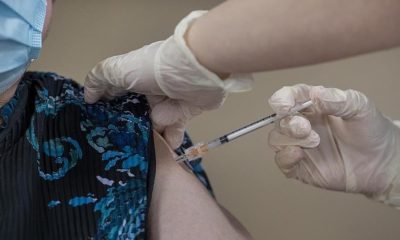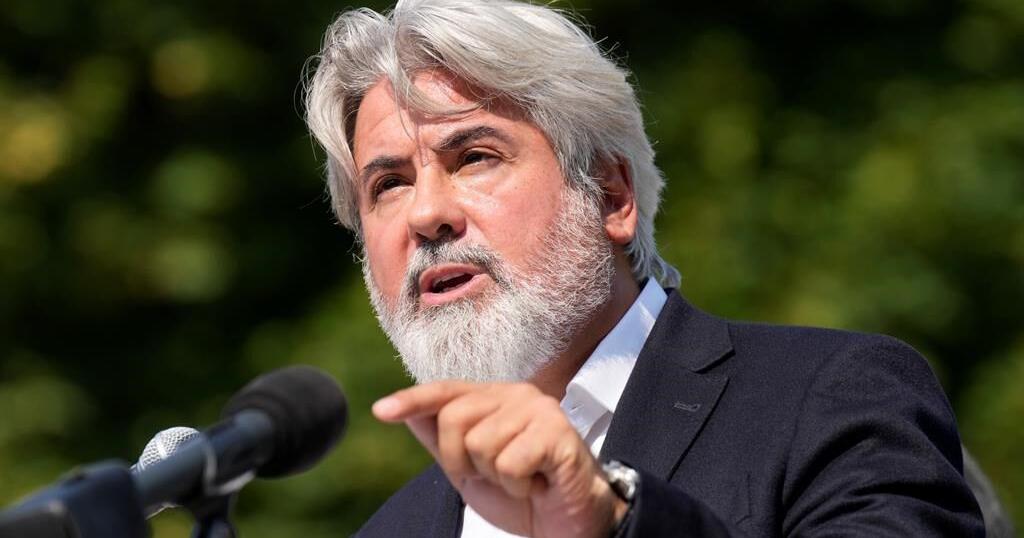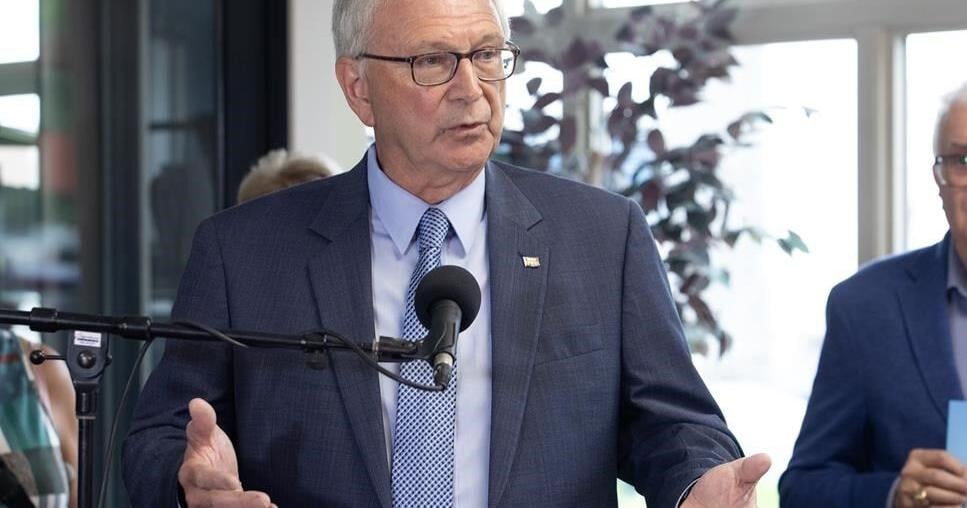This is the March 17, 2021, edition of the Essential Politics newsletter. Like what you’re reading? Sign up to get it in your inbox three times a week.
It’s been only 56 days since President Biden and Vice President Kamala Harris took the oath of office. But they’re making clear this week that they already have a hawk’s eye on the next elections, the 2022 midterms.
I know. Not shocking. Politicians politicking. But it’s early and Harris’ role in making the case for Democrats looks as if it’s going to be a big one, perhaps on par with Biden’s.
Good morning, and welcome to Essential Politics: Kamala Harris road edition. Today, I’ll examine Harris’ responsibility for helping her party keep its House and Senate majorities, and why the Biden-Harris administration is desperate for success.
First trips: to states with Senate races
Harris and Second Gentleman Doug Emhoff took their first official trips this week, and they did so as part of the administration’s “Help is Here” campaign, a victory lap for the $1.9-trillion COVID-19 relief package that Biden signed into law last week. (Harris and Emhoff spent a few personal days in Brentwood last month but did not hold public events. I wrote about Emhoff’s precedent-setting role in a story this week.)
Their destinations were telling: Las Vegas on Monday, the Denver area on Tuesday and Atlanta, where Harris plans to join Biden, on Friday. Biden stayed closer to home, with a stop in Chester, in Delaware County, Pa., outside Philadelphia, on Tuesday.
What do those four states — Nevada, Colorado, Pennsylvania and Georgia — have in common? All have Senate elections in 2022. Democratic Sens. Michael Bennet of Colorado, Catherine Cortez Masto of Nevada and Raphael Warnock of Georgia all were elected by less than 6 percentage points. Pennsylvania Sen. Pat Toomey, a Republican, is retiring, leaving an open seat in his politically divided state — and a chance for Democrats to add a sorely needed Senate seat.
Harris was joined by Nevada’s Democratic Gov. Steve Sisolak at a Las Vegas vaccination clinic, and then by Rep. Steven Horsford, a Nevada Democrat, to meet locals at the Culinary Academy. Near Denver, she met virtually with vaccination clinic workers, then went to an empanada store to speak with small-business people about the relief available.
Enjoying this newsletter? Consider subscribing to the Los Angeles Times
Your support helps us deliver the news that matters most. Become a subscriber.
Manchin rules?
Perhaps more than anything else, control of the Senate will determine Biden’s success as a president. If not for a pair of improbable Democratic victories in Georgia’s runoff elections in early January, Democrats would not enjoy that control now, and Biden would not have had the 50 votes to pass the COVID-19 bill into law. And if the party doesn’t hold on to that majority two years from now, he will have little chance of accomplishing much else legislatively, or winning confirmation of his judicial nominees.
Sen. Majority Leader Chuck Schumer (D-N.Y.) laid out the link to Georgia during a Rose Garden victory celebration on Friday.
“We Democrats made promises. We made promises in Georgia. We made promises in the country,” he said. “We said if we gained the Senate, kept the House and elected the president, we would finally get things done and get us out of this COVID crisis.”
But it’s the barest of Senate margins, 50 seats plus Harris’ tiebreaking vote. That makes Democrats’ priorities — including a minimum wage increase, a voting rights bill, an infrastructure plan — all but impossible without help from Republicans, because 60 votes are necessary in the Senate to overcome a filibuster. Democrats have it easier in the House but still hold a narrow margin there.
The lack of breathing room has given extraordinary power to Sen. Joe Manchin of West Virginia and other conservative Democrats. A previous edition of this newsletter explored Manchin’s leverage, and the compromises and political care that it requires of Harris and other administration officials.
And, as I also wrote recently, it has made Harris the focal point of criticism from progressive Democrats that the administration is not doing enough to push Manchin to support policies important to the left and to end the Senate’s filibuster rule.
The lack of a larger Senate majority forced Democrats to drop a proposal to increase the federal minimum wage to $15 from the COVID-19 package. Party conservatives also successfully demanded that the administration both tighten income limits for eligibility for relief checks and reduce emergency unemployment benefits.
Biden knows the math, and history. Presidents almost always lose seats in Congress during midterm elections, a fact of political life that cut into President Obama‘s power in his two terms, ultimately costing him the chance to fill a Supreme Court seat. Biden and his advisors have said they believe Democrats were hurt in Obama’s first midterm elections in 2010 in part because he did not brag enough about the 2009 stimulus package.
“From the beginning of this, Joe said, ‘We’ve got to tell the stories…. We’ve got to show that we understand what the people are experiencing and what they need,’” Harris said at the Rose Garden on Friday.
And, hey, it’s not hard to campaign on the achievement of sending out $1,400 checks to millions of Americans, among other goodies. “There’s rarely been a bill that’s so concrete and tangible,” Harris said.
Though congressional Republicans voted against the bill, it has been broadly popular, with about 70% support, according to recent polls. Harris will be at the forefront of promoting the law, in hopes of building momentum for the next phases of Biden’s agenda — voting rights, infrastructure, immigration — that will be tougher lifts.
Does visibility equal power?
Harris’ busy schedule this week is a reminder of her power to help sell Biden’s agenda. But hours before she left Washington on Monday, the Washington Post reported that former Obama advisor Gene Sperling would oversee spending from the $1.9-trillion package.
That’s the role Biden had when he was vice president after Obama signed his stimulus plan into law. And it is one Biden has often pointed to as demonstrating the clout and competence that prepared him for the presidency.
Was it a snub that Harris wasn’t given a similar job? Not necessarily. There are plenty of reasons, including experience, that Biden may have chosen Sperling, the only person to have led the White House National Economic Council for two presidents, Obama and Bill Clinton.
But it is a reminder that Harris, so far, has yet to receive a specific policy portfolio. She is in most of the important meetings with Biden and she is raising her profile in a highly visible retail-politicking role. But at some point, she will want to show she has a central role in the administration’s policies.
The latest from Washington
— Even as Biden’s administration encourages Americans to get vaccinated, the country remains divided along partisan lines on the shots, Chris Megerian writes. Can Republicans be persuaded to give COVID-19 vaccines a shot? Former President Trump joined the effort last night.
— Democrats loved Rep. Katie Porter (D-Irvine) when she bashed Trump. Now Jennifer Haberkorn reports that she’s turning her criticism toward her fellow party members, and it’s making them squirm.
— Biden promised Wednesday morning that any individual earning more than $400,000 a year would see some type of tax increase under his forthcoming economic plan.
— As Japan commemorates the 10-year anniversary of a deadly tsunami, the United States is reckoning with the vulnerability of its own systems for detecting massive sea waves. Anna M. Phillips reports that a broken pipe was all it took to shut down NOAA’s tsunami sensors last week.
— Also from Phillips: On Monday, Rep. Deb Haaland became the first Native American confirmed to serve in the president’s Cabinet — a historic moment celebrated by American Indians throughout the country. The Senate also overwhelmingly approved Isabel Guzman to lead the Small Business Administration. See where the rest of Biden’s nominees stand with The Times’ guide to his Cabinet.
— Russian President Vladimir Putin authorized influence operations to help then-President Trump in November’s presidential election, according to a declassified intelligence report that found broad efforts by the Kremlin and Iran to shape the outcome of the race. The report found no evidence that any foreign actor changed votes or disrupted the voting process.
— A rise in child migration has come at a time when many believe the Biden administration will be more welcoming than the former Trump White House, Molly Hennessy-Fiske reports. Some have called it a “crisis” and Cindy Carcamo has the latest on what’s new and what isn’t as immigration officials confront the wave of unaccompanied minors.
— U.S. officials have arrested and charged two men with assaulting U.S. Capitol Police Officer Brian Sicknick with bear spray during the Jan. 6 riot. It’s not yet known whether the assault caused the officer’s death.
The view from California
— Gov. Gavin Newsom pledged Monday to nominate a Black woman to replace Sen. Dianne Feinstein if the 87-year-old decides to retire before her term is up in 2024, Seema Mehta and Matthew Ormseth report. But Feinstein says she has no intention of stepping down, Haberkorn reports.
— In one of California’s most conservative counties, one woman has emerged as the leading antagonist against what she sees as creeping extremism in the region locals know as the North State, James Rainey writes.
More on the recall
— Newsom lashed out Monday at the effort to remove him from office, calling it a “Republican recall” fueled by Trump backers and warning that it could stymie California’s efforts to respond to the pandemic, John Myers writes. Still, he acknowledged that he expects the effort to qualify for the ballot, Phil Willon writes.
— Willon also reports that Newsom and his Democratic allies are dragging Trump center stage in their fight against the campaign, banking on the overwhelming distaste Californians hold for the former president to sink the effort.
Stay in touch
Keep up with breaking news on our Politics page. And are you following us on Twitter at @latimespolitics?
Did someone forward you this? Sign up here to get Essential Politics in your inbox.
Until next time, send your comments, suggestions and news tips to politics@latimes.com.































